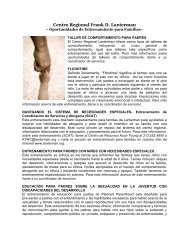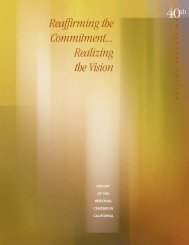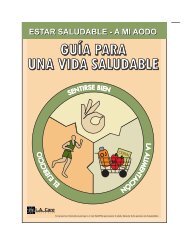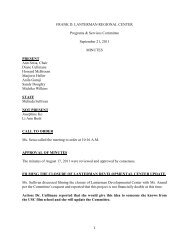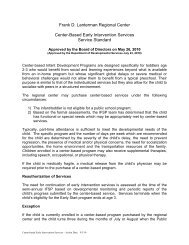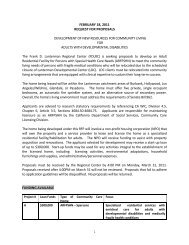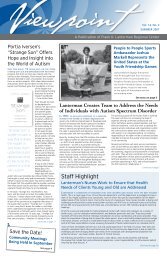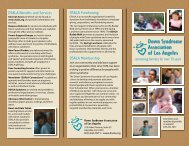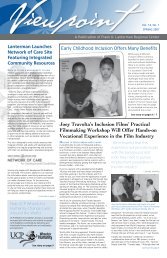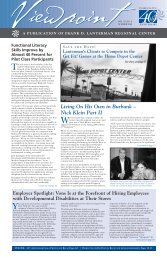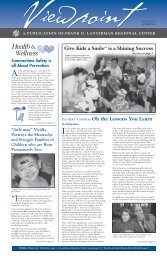Guide to Lanterman for Early Start Families - Frank D. Lanterman ...
Guide to Lanterman for Early Start Families - Frank D. Lanterman ...
Guide to Lanterman for Early Start Families - Frank D. Lanterman ...
Create successful ePaper yourself
Turn your PDF publications into a flip-book with our unique Google optimized e-Paper software.
Examples of <strong>Early</strong><br />
<strong>Start</strong> Services<br />
The services received through<br />
<strong>Early</strong> <strong>Start</strong> are based on the child’s<br />
assessed developmental needs and<br />
the family’s concerns and priorities<br />
as determined by each child’s<br />
Individualized Family Service Plan.<br />
<strong>Early</strong> <strong>Start</strong> services may include:<br />
• Assistive technology<br />
• Audiology<br />
• Family training, counseling and<br />
home visits<br />
• Health services<br />
• Medical services <strong>for</strong> diagnostic/<br />
evaluation purposes only<br />
• Nursing services<br />
About <strong>Early</strong> <strong>Start</strong> Services<br />
The Regional Center’s <strong>Early</strong> <strong>Start</strong> program serves children from birth <strong>to</strong> 3 who<br />
are born with, or at risk <strong>for</strong>, developmental delay or disability. We know that the<br />
earlier an infant or <strong>to</strong>ddler with special needs receives appropriate services, the<br />
more successful we can be in minimizing or preventing future disabilities. For<br />
this reason, our <strong>Early</strong> Intervention unit works with families <strong>to</strong> access services and<br />
supports that help identify and treat developmental concerns as early as possible in<br />
the life of the child. Services focus on the child’s development in five areas:<br />
v Cognitive – ability <strong>to</strong> think and learn<br />
v Physical – mo<strong>to</strong>r, including vision and/or hearing<br />
v Communication – ability <strong>to</strong> understand, talk<br />
v Social and emotional – ability <strong>to</strong> relate <strong>to</strong> others<br />
v Adaptive – ability <strong>to</strong> eat, dress and accomplish other self-help tasks<br />
Having a child with special needs often requires the family <strong>to</strong> devote extra time,<br />
energy or resources <strong>to</strong> the child’s care, and this can be challenging <strong>for</strong> both<br />
parents and siblings. At the same time, the primary responsibility <strong>for</strong> an infant’s<br />
or <strong>to</strong>ddler’s development and well-being rests with the family. For these reasons,<br />
services provided by the Regional Center are family centered, meaning they<br />
address the needs of the child within the context of the family with the intent of<br />
enhancing the family’s capacity <strong>to</strong> address their child’s special needs.<br />
• Nutrition services<br />
• Occupational therapy<br />
• Physical therapy<br />
• Psychological services<br />
• Respite services when necessary<br />
<strong>for</strong> the child’s parents <strong>to</strong> access<br />
<strong>Early</strong> <strong>Start</strong> trainings or workshops<br />
• Service coordination<br />
• Social work services<br />
• Special instruction<br />
• Speech and language services<br />
• Vision services<br />
<br />
<strong>Frank</strong> D. <strong>Lanterman</strong> Regional Center



